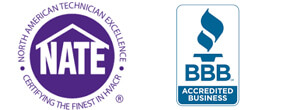As a homeowner, one of the most crucial decisions you’ll make is how to keep your home comfortable, especially during those bitter Batavia, NY winters. Your furnace has faithfully served you, but with advancements in HVAC technology, you may be wondering if it’s time to consider a change.
Heat Pump vs. Furnace:
When it comes to heating your home, you have several options, with two popular choices being heat pumps and furnaces. Both systems serve the same primary purpose – to keep your home warm during the cold months – but they operate differently and offer distinct advantages. Let’s explore the key differences between heat pumps and furnaces to help you make an informed decision for your home.
Operation:
Heat Pump: This operates by transferring heat to where it is needed. In the winter, it extracts heat from the outdoor air (even in cold temperatures) and pumps it inside to heat your home. In the summer, it reverses the process, removing heat from your indoor air and releasing it outside to cool your home.
Furnace: A furnace generates heat by burning fuel (natural gas, oil, or propane) or through electric resistance. It heats the air, which is then distributed throughout your home via ductwork. Furnaces are typically used for heating only and do not provide cooling.
Energy Efficiency:
Heat Pump: Heat pumps are known for their high energy efficiency. They can provide up to three times more heating or cooling energy compared to the electricity they consume. This efficiency makes them an excellent choice for moderate climates and areas with milder winters.
Furnace: Furnace efficiency can vary depending on the type and age of the system. While newer, high-efficiency furnaces are available, they may not be as energy-efficient as heat pumps, especially in mild weather.
Fuel Source:
Heat Pump: Heat pumps rely on electricity to operate. They do not burn fuel on-site, which means no emissions are produced at the heating source. This makes them environmentally friendly and reduces the risk of indoor air pollution.
Furnace: Furnaces can use a variety of fuel sources, including natural gas, oil, propane, or electricity. Gas and oil furnaces produce emissions, and their environmental impact depends on factors like fuel source and efficiency.
Dual Functionality:
Heat Pump: One of the significant advantages of a heat pump is its ability to provide both heating and cooling. This eliminates the need for a separate air conditioner, saving you money on installation and maintenance costs.
Furnace: Furnace service in Hamlin, NY are designed solely for heating. If you want both heating and cooling, you’ll need to invest in a separate air conditioning system.
Cold Weather Performance:
Heat Pump: While heat pumps can operate efficiently in cold weather, their performance may decline in extremely low temperatures. Some models include supplemental heating elements or backup systems to ensure consistent heating in harsh conditions.
Furnace: Furnaces, particularly gas or oil models, can provide reliable and consistent heating even in very cold climates. They are well-suited for regions with harsh winters.
Maintenance and Repairs:
Heat Pump: Heating maintenance in Batavia, NY require less maintenance compared to furnaces. However, they may need periodic inspections and maintenance to ensure optimal performance.
Furnace: Furnaces may require more frequent maintenance due to combustion-related components. Regular inspections, filter changes, and cleaning are essential for safe and efficient furnace operation.
Heat Pump Technology Advancements:
The world of HVAC technology is continually evolving, and heat pumps are no exception. Explore the exciting advancements that make heat pumps an even more compelling choice.
Stay up-to-date with the latest innovations in heat pump technology.
Variable-Speed Compressors:
Modern heat pumps often feature variable-speed compressors, which adjust the heating or cooling output based on your home’s needs. This enhances comfort and energy efficiency.
Zoning Systems:
Zoning systems allow you to divide your home into separate comfort zones, each with its own temperature control.
Smart Thermostats:
Heat pumps can be integrated with smart thermostats, allowing you to control your HVAC system remotely and optimize energy usage.
The Benefits of Transitioning From A Furnace to a Heat Pump
Transitioning from a furnace to a heat pump can offer a range of benefits for homeowners. Heat pumps are versatile HVAC systems that can provide both heating and cooling, and they operate differently than traditional furnaces. Here are some factors to help you make a decision:
Energy Efficiency:
One of the primary advantages of heat pumps is their exceptional energy efficiency. They can transfer heat from one location to another rather than generating it, making them significantly more energy-efficient than traditional furnaces. Here’s how they achieve this efficiency:
Heat Exchange: Heat pumps extract heat from the outdoor air (even in cold temperatures) and move it indoors to heat your home during the winter. In the summer, they reverse the process, removing heat from indoor air and releasing it outside to cool your home. This process is highly efficient, as it requires less energy compared to generating heat.
Coefficient of Performance (COP):
Heat pumps are rated based on their COP, which measures how much heating or cooling they provide per unit of electricity consumed. A COP greater than 1 indicates that a heat pump is more efficient than electric resistance heating, which typically has a COP of 1.
Year-Round Comfort:
Heat pumps offer both heating and cooling capabilities, eliminating the need for separate heating and air conditioning systems. This dual functionality ensures year-round comfort in your home, allowing you to maintain a pleasant indoor environment in all seasons. It’s a convenient and cost-effective solution, as you won’t need to invest in and maintain two separate HVAC systems.
Environmental Benefits:
Heat pumps are environmentally friendly heating and cooling options. They do not burn fuel on-site, which means they produce zero emissions at the heating source. Additionally, heat pumps can be powered by renewable energy sources, such as solar or wind power, further enhancing their environmental benefits.
Reduced Operating Costs:
While the initial installation cost may be higher compared to a traditional furnace, the long-term energy savings can offset this expense. Homeowners often find that heat pumps provide a cost-effective heating and cooling solution over time.
Zoning Capabilities:
Many modern heat pump systems can be equipped with zoning capabilities. Zoning allows you to divide your home into separate comfort zones, each with its temperature control. This customization enhances energy efficiency and individualized comfort for different areas of your home.
Smart Thermostat Integration:
Heat pumps can be integrated with smart thermostats, allowing you to control your HVAC system remotely and optimize energy usage. Smart thermostats can learn your preferences, adjust settings for energy savings, and provide real-time data to help you manage your HVAC system more effectively.
Making the decision to replace your furnace with a heat pump is a significant step towards enhancing your home’s comfort, efficiency, and sustainability. At Frontier Heating & AC Service, Inc., we understand the importance of this choice, and we’re here to support you every step of the way. Our community-oriented approach ensures that you’ll receive the guidance and expertise you need to make the right decision for your home in Batavia, NY. Heating repair in Batavia, NY is more than just a service; it’s our commitment to your comfort and well-being.











